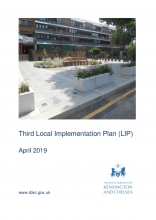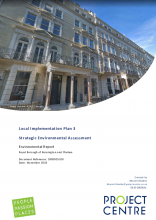Latest Local Implementation Plan (LIP)
Latest Local Implementation Plan (LIP)
The Mayor of London published his Transport Strategy (MTS) in March 2018. The aim is for 80 per cent of all trips in London to be made on foot, by cycle or using public transport by 2041 (compared with 63 per cent in 2015).
Our Third LIP sets out how we plan to implement the MTS locally as well as our other local transport-related priorities. LIPs are statutory documents and all London boroughs must prepare and submit their LIPs to Transport for London (TfL) for Mayor of London approval. See the MTS on the London.gov website.
There are four main elements of the Royal Borough of Kensington and Chelsea's LIP:
- A set of Borough Transport Objectives covering the 2019/20 to 2021/22 three-year LIP period and beyond.
- The transport challenges and opportunities that we face in the borough.
- A Delivery Plan of schemes, initiatives and policies covering the period 2019/20 to 2021/22.
- LIP targets and delivery indicators.
The Royal Borough of Kensington and Chelsea Commonplace survey
To help shape the themes of our LIP we ran an online map-based ‘Commonplace’ survey during the summer of 2018, inviting people to tell us the kind of transport improvements they would like to see in their local area. See the online map.
407 people responded to the question ‘What is your biggest concern about getting around on Kensington and Chelsea's streets? Amongst all respondents the top five concerns in descending order were:
- cycling doesn’t feel safe
- pollution
- speed of traffic
- too much rat-running
- congestion for cars
Amongst those who stated that they lived in the borough the top five concerns were:
- pollution
- speed of traffic
- congestion for cars
- too much rat-running
- cycling doesn’t feel safe
Key projects, policies and initiatives proposed in our LIP include:
- considering pedestrians’ wish for ‘green man’ facilities at busy junctions, which will reduce traffic capacity and increase queues, even if these would not have the traditional road casualty based justification
- consulting on introducing pilot 20 mph limits in some streets and areas
- examining TfL's proposals to improve conditions for walking and cycling along the Holland Park Avenue/Notting Hill Gate/Bayswater Road corridor
- introducing one or more ‘floating’ car clubs, which allow customers to make one-way trips, paying by the minute, without having to return the car to a dedicated bay
- reviewing the case for taking on powers to enforce moving traffic offences, such as yellow box junctions and banned turns, to make sure road users observe traffic restrictions
- a trial of part-time ‘school streets’ in which motor vehicle access is limited at school drop-off and pick-up times to encourage children to walk to school and improve safety
- considering opportunities to introduce restrictions to move traffic away from residential roads in some circumstances
- working with TfL to find sites for rapid electric vehicle chargers
Last updated: 29 November 2019


